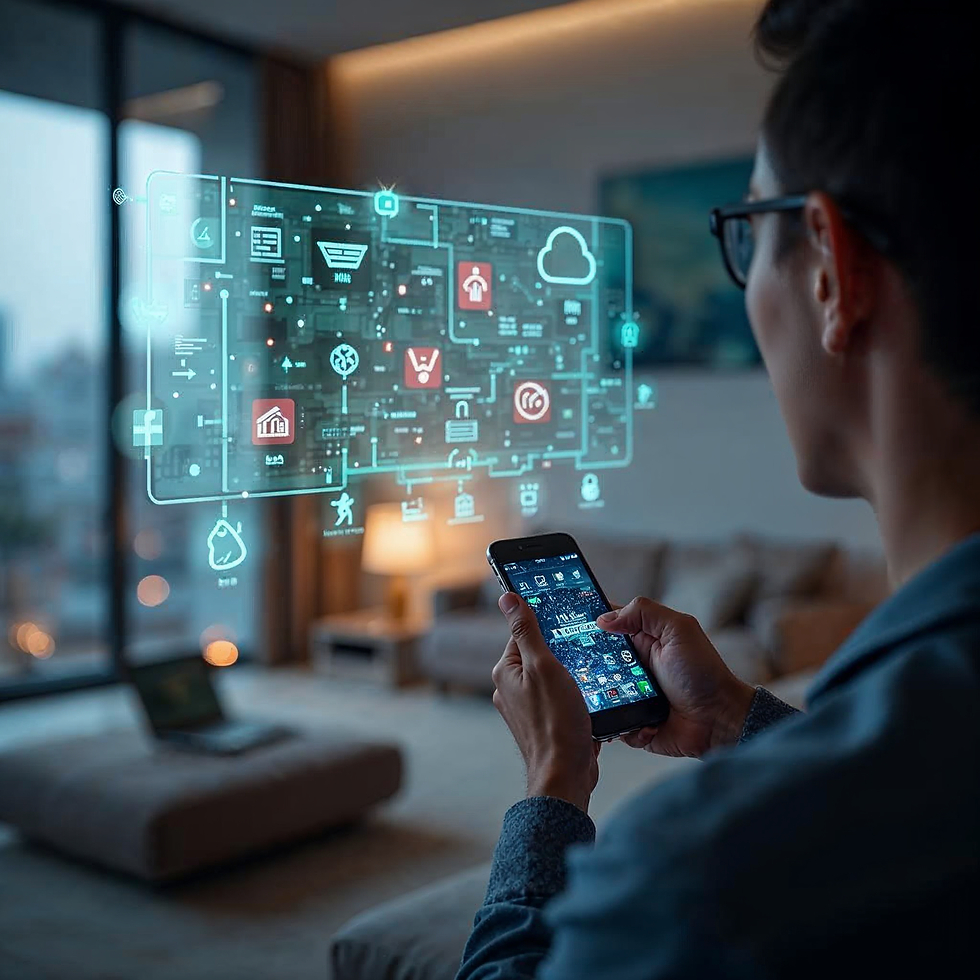Smart Home Upgrades: Turning Your Remodeling Project into a Wise Investment
- davisrenosde
- Oct 1, 2025
- 5 min read
Imagine stepping into your home and having the lights adjust, the thermostat set to the perfect temperature, and your favorite music playing - all without lifting a finger. Smart home upgrades are no longer just a luxury; they're a smart investment with serious returns. As more homeowners integrate these technologies during remodeling projects, they're not only enhancing comfort but also boosting property value. Dive into the world of smart tech and discover how these innovations can transform your space and your bottom line.
Introduction to Smart Home Upgrades

Benefits of Smart Home Features
Smart home features offer a range of advantages that go beyond mere convenience. They can significantly improve your quality of life, enhance security, and reduce energy consumption.
One of the primary benefits is the ability to control various aspects of your home remotely. This means you can adjust your thermostat, turn off lights, or even start your coffee maker from your smartphone, no matter where you are.
Safety is another crucial aspect. Smart security systems can alert you to potential threats and allow you to monitor your home in real-time, giving you peace of mind whether you're at work or on vacation.
Popularity in Remodeling Projects
The integration of smart technologies in home remodeling projects has seen a substantial increase in recent years. Homeowners are recognizing the value these upgrades bring to their daily lives and property values.
According to a recent survey, over 60% of homeowners planning a renovation project express interest in incorporating at least one smart home feature. This trend is particularly strong among millennials and Gen X homeowners.
The most popular smart upgrades include security systems, thermostats, and lighting controls. As technology advances and becomes more affordable, we can expect to see this trend continue to grow.
Key Smart Technologies for Remodeling
Smart home technologies are reshaping the way we interact with our living spaces. Let's explore some of the most impactful options for your remodeling project.
Smart Lighting Solutions
Smart lighting systems offer more than just the ability to turn lights on and off remotely. They provide customizable ambiance, energy savings, and enhanced security for your home.
With smart bulbs and switches, you can create lighting schedules that mimic your daily routines. This feature is particularly useful when you're away, as it gives the impression that someone is home, deterring potential intruders.
Many smart lighting systems also offer color-changing options, allowing you to set the perfect mood for any occasion. Whether you're hosting a dinner party or settling in for a movie night, you can adjust your lighting with a simple voice command or tap on your smartphone.
Advanced Security Systems
Modern smart security systems provide comprehensive protection for your home, combining various technologies to keep you and your family safe.
These systems typically include smart doorbells with video capabilities, allowing you to see and communicate with visitors even when you're not home. Motion sensors and cameras can alert you to any unusual activity around your property.
Smart locks are another key component, enabling you to control access to your home remotely. You can grant temporary access to service providers or guests without having to be present or worry about lost keys.
Energy-Efficient Thermostats
Smart thermostats are a game-changer when it comes to home comfort and energy efficiency. These devices learn your preferences and routines, automatically adjusting the temperature to optimize comfort and energy use.
By connecting to your home's Wi-Fi, smart thermostats can be controlled from anywhere using your smartphone. This means you can adjust the temperature before you arrive home or if you've forgotten to turn off the AC when leaving for vacation.
Many smart thermostats also provide detailed energy reports, helping you understand your usage patterns and identify opportunities for further savings. Some models can even detect when windows are open or when you're away, adjusting settings accordingly to maximize efficiency.
Financial Benefits of Smart Investments
Investing in smart home technologies can yield significant financial returns. Let's break down how these upgrades can benefit your wallet in the long run.
Return on Investment Explained
The return on investment (ROI) for smart home upgrades can vary depending on the specific technologies installed and the local real estate market. However, many homeowners find that these investments pay off both in terms of energy savings and increased property value.
Smart thermostats, for example, can lead to energy savings of 10-15% on heating and cooling costs. Over time, these savings can add up to hundreds of dollars annually.
When it comes to resale value, homes with smart features often command higher prices. A study by the National Association of Realtors found that buyers are willing to pay up to 5% more for homes with smart technology already installed.
Long-Term Savings Breakdown
The long-term savings from smart home upgrades can be substantial. Let's look at a few examples:
Smart lighting systems can reduce electricity usage by up to 90% compared to traditional incandescent bulbs.
Energy-efficient smart appliances can cut energy consumption by 10-50%, depending on the specific appliance and usage patterns.
Smart water systems can help detect leaks early, potentially saving thousands of dollars in water damage repairs.
Over a 5-10 year period, these savings can offset the initial investment costs and continue to provide financial benefits for years to come.
Enhancing Everyday Living with Technology

Smart home technologies do more than just save money - they can significantly improve your quality of life. Let's explore how these upgrades can enhance your daily routines.
Convenience and Accessibility
Smart home features can make everyday tasks easier and more convenient, especially for those with mobility issues or busy schedules.
Voice-controlled assistants like Amazon Alexa or Google Home can help you manage your smart devices hands-free. You can ask them to adjust the thermostat, turn on lights, or even start your robot vacuum cleaner.
Smart appliances, such as refrigerators with built-in cameras, allow you to check your grocery inventory while at the store. Connected ovens can be preheated remotely, ensuring dinner is ready faster when you get home from work.
Health and Wellness Enhancements
Smart home technologies can also contribute to a healthier living environment. Air quality monitors can alert you to pollutants or allergens in your home, while smart water filtration systems ensure clean, safe drinking water.
Smart lighting systems can be programmed to mimic natural light patterns, potentially improving sleep quality and overall well-being. Some systems even offer "circadian lighting" that adjusts color temperature throughout the day to support your body's natural rhythms.
For those with medical needs, smart medication dispensers can provide reminders and track usage, ensuring proper adherence to prescription schedules.
Planning Your Smart Home Upgrade

Embarking on a smart home upgrade requires careful planning and consideration. Here's how to approach your project for the best results.
Choosing the Right Technologies
Selecting the right smart technologies for your home depends on your specific needs, budget, and existing infrastructure. Start by identifying your primary goals - whether it's enhancing security, improving energy efficiency, or increasing convenience.
Consider the compatibility of different systems. Opting for devices that work with major platforms like Apple HomeKit, Google Home, or Amazon Alexa can ensure seamless integration and ease of use.
Don't forget to factor in your home's existing wiring and internet capabilities. Some systems may require professional installation or upgrades to your current setup.
Working with Professionals
While many smart home devices are designed for DIY installation, working with professionals can ensure optimal performance and integration of your new systems.
A smart home consultant can help you design a comprehensive plan that meets your needs and budget. They can also advise on the best products for your specific situation and ensure all systems work together smoothly.
For more complex installations, such as whole-home automation systems or advanced security setups, professional installation is often necessary. This can help avoid potential issues and ensure your new smart home features function as intended.





Comments